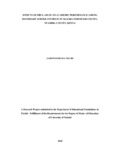| dc.description.abstract | This study aimed at investigating the effect of drug abuse on the academic performance of students in Masaba North Sub-County. The objectives of the study were to; determine the commonly abused drugs, establish the causes of drug abuse among students, determine the effects of drug abuse on academic performance and establish measures put in place to curb drug abuse in school. The study employed descriptive survey research design. Target population was 32 secondary schools in Masaba North sub-county. Simple random sampling technique was used to sample 11 secondary schools. Twelve form three students were sampled using class register from each of the 11 schools sampled. Eleven principals and 11 guidance and counseling teachers from each sampled school were also used as respondents. A total sample size of 154 respondents was used. The study used questionnaires and interview schedule to collect primary data. The data collected was analyzed using Statistical Package for Social Sciences (SPSS) software program and presented using descriptive methods such as frequencies, means, standard deviation and percentages and presented as tables and figures. The study established that alcohol, bhang and tobacco were the most abused drugs in secondary schools in Masaba North Sub-County. Sources of drugs identified were fellow students and small kiosks or shops in the schools‟ neighbourhoods. Causes of drug abuse established were; peer influence, availability of money to buy drugs and the family background. The study concluded that drug and substance abuse among the students led to school drop outs, strained relationship with other students, lack of interest in studying, truancy, low concentration span and healthy problems such as anxiety, headaches, feeling sleepy and confusion leading to declining academic performance. Based on these findings, the researcher recommended that schools should develop a drug policy, to create awareness of the effect of drug abuse among students and lias with all educational stakeholders so as to improve students‟ academic performance. Students who are identified as drug abusers should not be expelled from schools but should be accepted in the community and be helped through guidance and counselling. Although the Ministry of Education has integrated drug abuse in some subjects, it should also consider developing a curriculum on effects of drug abuse. This will ensure that all students are informed about consequences of drug abuse in order to make informed judgements. The study suggests that further studies should be carried out on involvement of teachers and parents in curbing drug abuse and students perception on strategies used by school principals | en_US |



